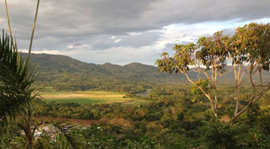 One of the key objectives of WAVES is to help develop internationally agreed guidelines for ecosystem accounting. The work on this front is led by the Policy and Technical Experts Committee (PTEC), a multidisciplinary body consisting of experts in economics, environmental accounting, natural sciences, and policy from the World Bank, UNEP, academic institutions, and governments (WAVES PTEC Member list). In addition to methodology development, PTEC also leads work to compile evidence on policy applications of natural capital accounts and to develop training materials.
One of the key objectives of WAVES is to help develop internationally agreed guidelines for ecosystem accounting. The work on this front is led by the Policy and Technical Experts Committee (PTEC), a multidisciplinary body consisting of experts in economics, environmental accounting, natural sciences, and policy from the World Bank, UNEP, academic institutions, and governments (WAVES PTEC Member list). In addition to methodology development, PTEC also leads work to compile evidence on policy applications of natural capital accounts and to develop training materials.
Ecosystem Values Assessment & Accounting Project in Peru

In July 2013 a Conservation International / WAVES PTEC team visited Peru for a Scoping Mission for the Ecosystem Values Assessment & Accounting Project (EVA), which is funded by the Gordon and Betty Moore Foundation and supported by PTEC as one of its three pilot projects for testing of methodologies for ecosystem accounts. EVA is being implemented with the ultimate goal of incorporating nature’s value into decision-making and informing more sustainable policies and practices. Read More
Photo Credit: CI/Daniel Juhn
Field-Testing Ecosystem Accounting
To operationalize the framework for ecosystem accounts as detailed in SEEA: Experimental Ecosystem Accounts and to test different methodologies to develop guidance on how ecosystem accounts can be compiled, PTEC is supporting pilot studies in three sites:
- Himachal Pradesh, India, is focusing on ecosystem accounting to support better land and forest management critical for the state’s important hydropower industry. PTEC is testing to alternative tools—InVEST (Integrated Valuation of Environmental Services and Tradeoffs) and SWAT (Soil and Water Assessment Tool)—to develop guidance for measuring and valuing soil retention and water-regulating services of forests.
- The University of Wageningen's EcoSpace project is using spatial and biophysical modeling to measure ecosystem services in the context of land use change. The project is being implemented in Indonesia, the Netherlands, and Norway..
- Conservation International (CI), under the Ecosystem Values Assessment and Accounting (EVA), is taking a broad and practical approach to incorporating natural capital into decision making consistent with the SEEA.
For all three pilots, modest contributions from WAVES are being leveraged with substantial external resources: the pilot in India is largely being funded as part of a technical assistance program linked to the World Bank development policy loan with the government of Himachal Pradesh to promote sustainable development and inclusive green growth. CI has its own funding for its pilot in Peru, and WAVES has provided the project additional technical support to test the SEEA framework for ecosystem accounting. Ecospace is fully funded and is sharing its lessons learned with the group to guide the design and implementation of the other pilots.
Other guidance notes on valuing and accounting for ecosystems and ecosystem services have also been commissioned. They include the following:
- Valuation methodologies suitable for accounting for regulating ecosystem services;
- Accounting for coastal and marine ecosystems and their services; and
- Mapping, valuing, and accounting for watershed services.
Related Links
- Environmental Valuation and Greening the National Accounts: Challenges and Initial Practical Steps
- Natural Capital Committee
- The Economics of Ecosystems and Biodiversity (TEEB)
- Moving Beyond GDP
- Australian Bureau of Statistics
- UN System of Environment-Economic Accounting (SEEA)
- Project for Ecosystem Services (Proecoserv)
- Inclusive Wealth Report - A report from the United Nations Environment Programme
- Environmental Valuation and Greening the National Accounts (pdf)
- Ecosystem Services and Wealth Accounting - A report by Edward B. Barbier, University of Wyoming (pdf)
- WAVES Feature: Maps Reveal Big Picture on Land Use
- WAVES Feature: Turning the Tide to Capture the Full Value of Coastal and Marine Ecosystems
Compiling Policy Applications
PTEC also oversees the compilation of evidence on the policy applications of natural capital accounting. This year, PTEC commissioned a study to survey statistical agencies in countries that compile natural capital accounts to gather systematic information on who is using these accounts and for what purpose. A report based on survey results from 12 countries has been completed and demonstrates that environmental accounts are policy relevant (Users and Uses of Environmental Accounts: A Review of Leading Countries). They respond directly to stated policy goals in a number of nations. In other cases, data from the accounts are used as part of the evidence base to monitor policy success. In still others, they feed into analytical research that either leads to policy action or assesses the success of that action.
More such work is needed and PTEC will be working with partners like France on taking this forward. The next stage will include, for example, a survey of modeling applications that use SEEA data to show evidence on how analytical work has been or can be used by governments, or other decision makers, to inform or influence policy dialogue.
In the coming year, PTEC will support a report to focus on policy applications of wealth and NCA, making a case for why countries should build these accounts. The report will discuss potential policy applications and the types of policy issues that these accounts can help address, substantiated with evidence from country examples of actual policy applications. It will draw links to the World Bank’s goals of eradicating extreme poverty and promoting shared prosperity in a manner that is sustainable over time and across generations, discussing the role of wealth and NCA in helping countries meet these goals. The report will highlight applications for macroeconomic policy issues and sectoral policy discussions touching upon the extractives sector and renewable natural resources–related sectors.
Training and Capacity Development on Forest Accounting
This year has also seen the development of the Forest Accounting Sourcebook: Policy Applications and Basic Compilation. The sourcebook is an update of an earlier Food and Agriculture Organization (FAO) publication and complements a family of handbooks within the SEEA, notably the Central Framework and Experimental Ecosystem Accounting. A number of WAVES countries have prioritized forest accounts, and have asked for guidance on how to construct and subsequently use the accounts as a tool for policy making. The sourcebook will meet the growing demand for guidance and training material for compiling, implementing, and demonstrating policy applications of forest accounting.
The draft sourcebook was presented during the three-day Global Workshop on Forest Accounting in May 2014. The workshop will bring the NCA “community of practice” on forest accounts together to share experiences and discuss challenges, responses, and next steps for mainstreaming forest accounting into development policy. Once finalized, the sourcebook and the supplementary training materials will be used for regional training workshops. Two such workshops are planned for fall 2014 in the Latin America and South Asia regions.
The Way Forward
Over the next year, PTEC will continue to support testing of methodologies for ecosystem accounting, developing guidelines for compiling ecosystem accounts and using them to inform policy, gathering evidence on policy applications of natural capital accounts, and developing training materials to support capacity development.
To leverage resources, spur research on ecosystem valuation and accounting by other research networks, and coordinate with efforts that have similar goals, the development of partnerships with other institutions will be prioritized.
PTEC, for one, expects to work closely with the ecosystem accounting pilots that will be carried out by the UN Statistics Division (UNSD) and The Economics of Ecosystems and Biodiversity (TEEB) initiative. WAVES will serve on the steering committee set up by the UNSD, and to increase collaboration, the UNSD has been invited to join PTEC. PTEC is in discussions with the Latin America and Caribbean Environmental Economics Program, the South Asia Network of Development and Environmental Economists, and the Environmental Economics Program for South East Asia to explore how research priorities identified as critical for the development of the methodology for ecosystem accounting can be supported by these networks. Discussions are well under way with the Swedish International Development Cooperation Agency and Swedish Environmental Protection Agency to support research on PTEC priorities through the Environment for Development network.
PTEC last met October 29-31, 2014 in Washington, D.C. for their Third Annual Meeting (see agenda and links to presentations).
|
|||||
|
|
|
|||
|
May: A workshop to design pilots for ecosystem accounting in two sites - Himachal Pradesh and Peru -- and to explore the possibility of coordinating with on-going on ecosystem accounting led by University of Wageningen’s EcoSpace project. Discussions contributed to
|
At the annual PTEC meeting five key priority research areas were determined (see agenda):
|
|||
